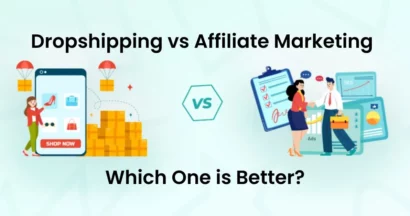Affiliate marketing is a fantastic way to earn money online by promoting other people’s products or services. It’s a performance-based model where you earn a commission for every sale, lead, or click you generate through your unique affiliate link.
This guide will walk you through the steps on how to become an affiliate marketer, from understanding the basics to mastering advanced strategies. Whether you’re a complete beginner or have some experience, you’ll find valuable insights to help you succeed in this exciting field.
Claue – Clean and Minimal Magento Theme
We provide an amazing Magento theme with fast and responsive designs. Let’s find out!
What is an Affiliate Marketer?

An affiliate marketer is essentially an online salesperson who promotes products or services from other companies. Instead of getting a fixed salary, they earn commissions based on their performance.
Here’s how it works:
- You join an affiliate program: Many companies, from large eCommerce giants to individual entrepreneurs, offer affiliate programs, such as Referral Factory.
- You get a unique affiliate link: This special link tracks your referrals.
- You promote products/services: You can do this through various channels, such as a blog, website, social media, email list, or YouTube channel.
- Customer clicks your link: When someone clicks your link and takes a specific action (like making a purchase), it gets tracked.
- You earn a commission: You receive a percentage of the sale or a fixed amount for each successful referral.
Why Choose Affiliate Marketing?

Affiliate marketing offers a plethora of benefits, making it an attractive venture for individuals seeking financial independence and flexibility:
- Low Startup Costs: Unlike traditional businesses, affiliate marketing requires minimal investment to get started.
- Passive Income Potential: Once your affiliate marketing system is in place, you can earn passive income even while you sleep.
- Work From Anywhere: As long as you have an internet connection, you can manage your affiliate marketing business from any corner of the globe.
- Flexible Schedule: You’re the boss! Set your own hours and work at your own pace.
- Diverse Niche Options: From fashion and beauty to technology and finance, you can choose a niche that aligns with your interests and expertise.
Essential Skills to Be an Affiliate Marketer
While affiliate marketing may seem straightforward, success requires a diverse skillset:
- Digital Marketing: A strong understanding of digital marketing principles, including SEO, content marketing, social media marketing, and email marketing, is crucial for driving traffic to your affiliate links.
- Content Creation: Creating high-quality, engaging content that attracts and resonates with your target audience is essential for building trust and driving conversions. This could include blog posts, product reviews, videos, or social media updates.
- Communication Skills: Effectively communicating the value of the products you’re promoting and persuading your audience to take action is key to generating sales.
- Data Analysis: Tracking and analyzing your performance data is crucial for optimizing your campaigns and maximizing your earnings. You need to understand metrics like click-through rates, conversion rates, and return on investment.
- Networking: Building relationships with other affiliate marketers, merchants, and influencers can help you expand your reach and learn from experienced professionals.
How to Become an Affiliate Marketer: A Step-by-Step Guide
Now that you understand the fundamentals, let’s delve into the step-by-step process of embarking on your affiliate marketing journey:
1. Select a Profitable Niche:

Your niche is the specific area you’ll focus on. It could be anything from fitness and nutrition to technology and gaming. Choosing the right niche is crucial for your success as an affiliate marketer. Here’s how to do it:
- Consider your interests and passions: What are you knowledgeable and enthusiastic about? Promoting products you genuinely believe in will make your job easier and more enjoyable.
- Research the market: Is there enough demand for products in your chosen niche? Are there affiliate programs available? Use tools like Google Trends and keyword research to assess the market potential.
- Evaluate the competition: How crowded is the niche? While some competition is healthy, an overly saturated niche can make it harder to stand out.
- Identify your target audience: Who are you trying to reach? Understanding their needs and preferences will help you tailor your content and marketing efforts.
2. Choose Your Platform:

You need a platform to reach your audience and promote your affiliate links. There are several options available for an affiliate marketer to choose from:
- Blog: A blog gives you a platform to create in-depth content, build an audience, and establish yourself as an authority in your niche.
- Website: Similar to a blog, a website provides a central hub for your affiliate marketing activities.
- Social media: Platforms like Instagram, Facebook, and TikTok offer opportunities to reach a large audience and promote products through engaging content.
- Email marketing: Building an email list allows you to directly communicate with your audience and promote affiliate offers.
- YouTube channel: If you’re comfortable in front of the camera, creating video content on YouTube can be a powerful way to engage your audience and promote products.
3. Find and Join Affiliate Programs:

Once you have a niche and platform, it’s time to find affiliate programs to join. If you’re using WooCommerce, explore these top 7 WooCommerce affiliate plugins to enhance your affiliate strategy. Here are some popular options:
- Affiliate networks: Networks like ShareASale, CJ Affiliate, and Awin connect you with a wide range of merchants and products.
- Direct affiliate programs: Many companies offer their own affiliate programs. You can usually find information about these programs on their websites.
- Amazon Associates: One of the largest affiliate programs globally, offering millions of products to promote.
When choosing affiliate programs, consider factors like commission rates, cookie duration, payment terms, and the reputation of the merchant.
4. Create High-Quality Content:

Content is king in affiliate marketing. You need to create valuable and engaging content that will attract your target audience and encourage them to click on your affiliate links. Here are some content ideas:
- Product reviews: Provide in-depth reviews of products in your niche, highlighting their features, benefits, and drawbacks.
- Comparison articles: Compare different products side-by-side to help your audience make informed decisions.
- Tutorials and how-to guides: Teach your audience how to use products or solve problems related to your niche.
- Listicles: “Top 10” lists or “Best of” compilations are a popular format for affiliate content.
- Case studies: Share real-life examples of how products have helped you or others.
5. Promoting Your Affiliate Links:

Creating content is just the first step. You also need to promote your affiliate links to drive traffic and generate clicks. Here are some strategies:
- Search engine optimization (SEO): Optimize your website and content to rank higher in search engine results pages (SERPs).
- Social media marketing: Share your content and affiliate links on social media platforms.
- Email marketing: Promote affiliate offers to your email subscribers.
- Paid advertising: Use platforms like Google Ads or social media ads to reach a wider audience.
6. Build Trust with Your Audience:

Trust is essential in affiliate marketing. Your audience needs to believe in your recommendations before they’ll click on your affiliate links. Here’s how to build trust:
- Be transparent: Disclose your affiliate relationships upfront.
- Provide honest reviews: Don’t just promote products for the sake of earning a commission. Only recommend products you genuinely believe in.
- Offer valuable content: Focus on providing helpful and informative content that addresses your audience’s needs.
- Engage with your audience: Respond to comments and questions, and build relationships with your followers.
7. Track Your Results and Optimize:

It’s important to track your affiliate marketing performance to see what’s working and what’s not. Use tools like Google Analytics to track your website traffic and affiliate link clicks. Analyze your data to identify areas for improvement.
8. Stay Updated and Adapt:
The world of affiliate marketing is constantly evolving. Stay updated on the latest trends, technologies, and best practices. Be willing to adapt your strategies to stay ahead of the curve.
Monetization Strategies for Affiliate Marketers
Apart from the traditional commission-based model, explore alternative monetization strategies to diversify your income streams:
- Product Reviews: Offer in-depth product reviews that highlight the features, benefits, and drawbacks of products within your niche.
- Comparison Articles: Compare and contrast different products to help your audience make informed purchasing decisions.
- Tutorials and How-to Guides: Create tutorials or how-to guides that demonstrate the use or application of products.
- Resource Pages: Curate a list of recommended products or tools within your niche.
- Email Courses: Develop email courses that provide valuable information and incorporate affiliate links for relevant products.
Best Practices for Successful Affiliate Marketing
Adhering to best practices can significantly enhance your affiliate marketing endeavors:
- Disclose Your Affiliate Relationships: Be transparent with your audience and disclose your affiliate partnerships.
- Promote Products You Believe In: Only recommend products you genuinely believe in and that align with your audience’s needs.
- Provide Value to Your Audience: Focus on creating content that provides value and addresses your audience’s pain points.
- Build an Email List: Cultivate an email list to nurture relationships with your audience and promote affiliate offers.
- Stay Updated: Keep abreast of industry trends, new products, and marketing strategies to stay ahead of the curve.
Overcoming Challenges in Affiliate Marketing
Affiliate marketing, like any other venture, comes with its own set of challenges:
- Competition: The affiliate marketing landscape can be competitive. Differentiate yourself by offering unique value and building a strong brand.
- Building Trust: Establishing trust with your audience takes time and effort. Be transparent, and authentic, and focus on providing value.
- Choosing the Right Products: Selecting the right products to promote is crucial. Conduct thorough research and consider your audience’s needs.
- Driving Traffic: Generating consistent traffic to your affiliate links can be challenging. Employ diverse traffic generation strategies and continuously optimize your campaigns.
Be aware of potential pitfalls by learning about common affiliate marketing scams to avoid.
Conclusion
Becoming a successful affiliate marketer requires dedication, persistence, and a strategic approach. By following the steps outlined in this guide and adhering to best practices, you can pave your path to affiliate marketing success. Remember to choose a niche you’re passionate about, create high-quality content, build trust with your audience, and continuously analyze and optimize your campaigns. With patience and perseverance, you can transform your passion into a thriving online business.
Read more:
Dropshipping vs Affiliate Marketing: Which is Better?
What Is an eCommerce Business Model? (8+ Common Types)
10+ Famous Marketing Models That Will Transform Your Strategy
Contact US | ThimPress:
Website: https://thimpress.com/
Fanpage: https://www.facebook.com/ThimPress
YouTube: https://www.youtube.com/c/ThimPressDesign
Twitter (X): https://x.com/thimpress_com



